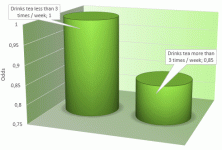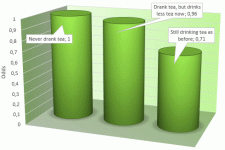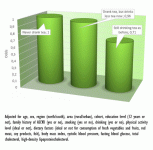Do you want to live longer? Drink three cups of tea a week...
Tea is healthy. We won't tell you anything new. But animal studies have given you the idea that tea is only healthy if you drink liters of it, or take high-dose extracts, then we have good news for you. According to recent figures from China, tea is also healthy if you only drink three cups a week.
Study
The researchers, affiliated with the Chinese Academy of Medical Sciences and Peking Union Medical College, analyzed the data of about 100,000 adults who participated in the Prediction for ASCVD Risk in China study. The researchers followed the study participants for an average of 7.3 years.
The tea drinkers in this study mainly drank green tea. Only 8 percent of tea drinkers preferred black tea. The researchers therefore think that their findings do not automatically apply to tea drinkers in the west - who mainly drink black tea.
Results
Drinking tea at least three times a week reduced the risk of death by 15 percent, the researchers discovered.
The positive health effect of tea was especially strong in people who, during the study, continued to drink tea. Tea drinkers who started drinking less tea during the study, or even stopped drinking tea, were significantly less protected than the tea drinkers who continued to drink tea the way they used to.
The figure below shows that drinking tea added an average of 1.26 years to the life of a hypothetical 50-year-old tea drinker. The figure also makes clear where the profit in part comes from: tea reduces the risk of vascular disease.
Apparently the polyphenols in tea protect the blood vessels, the researchers interpret their data.
Source: Eur J Prev Cardiol. 2020;2047487319894685. doi:10.1177/2047487319894685.
Tea is healthy. We won't tell you anything new. But animal studies have given you the idea that tea is only healthy if you drink liters of it, or take high-dose extracts, then we have good news for you. According to recent figures from China, tea is also healthy if you only drink three cups a week.
Study
The researchers, affiliated with the Chinese Academy of Medical Sciences and Peking Union Medical College, analyzed the data of about 100,000 adults who participated in the Prediction for ASCVD Risk in China study. The researchers followed the study participants for an average of 7.3 years.
The tea drinkers in this study mainly drank green tea. Only 8 percent of tea drinkers preferred black tea. The researchers therefore think that their findings do not automatically apply to tea drinkers in the west - who mainly drink black tea.
Results
Drinking tea at least three times a week reduced the risk of death by 15 percent, the researchers discovered.
The positive health effect of tea was especially strong in people who, during the study, continued to drink tea. Tea drinkers who started drinking less tea during the study, or even stopped drinking tea, were significantly less protected than the tea drinkers who continued to drink tea the way they used to.
The figure below shows that drinking tea added an average of 1.26 years to the life of a hypothetical 50-year-old tea drinker. The figure also makes clear where the profit in part comes from: tea reduces the risk of vascular disease.
Apparently the polyphenols in tea protect the blood vessels, the researchers interpret their data.
Source: Eur J Prev Cardiol. 2020;2047487319894685. doi:10.1177/2047487319894685.



